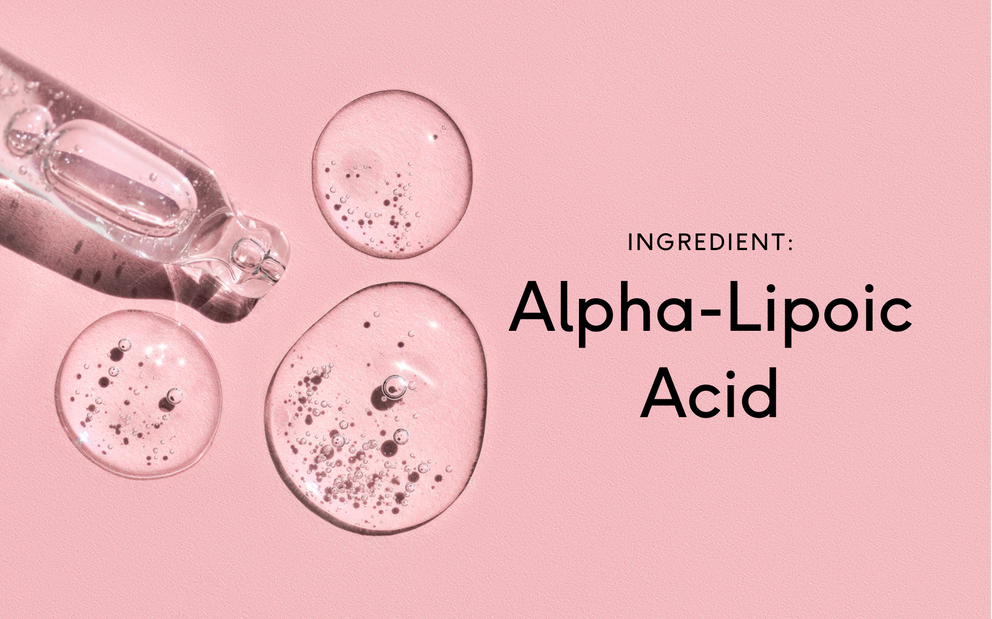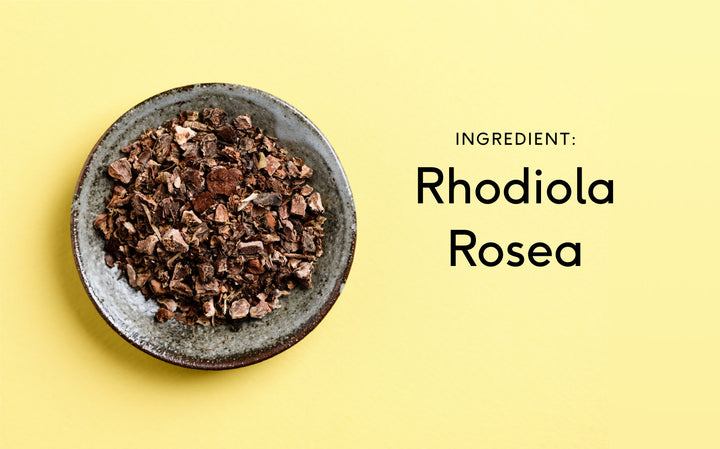Learn About Alpha-Lipoic Acid in 5 Minutes
Table of contents

What is alpha-lipoic acid?
Alpha-lipoic acid (ALA) is an organosulfur compound that helps with cell signalling and oxidative stress. ALA occurs naturally in most animals, and the mitochondria in your cells make limited quantities of this important acid. By binding to your proteins, ALA prevents cell death and protects you from disease, but your body doesn’t make enough alpha-lipoic acid for you to enjoy the true benefits of this substance.
- Binds to proteins in the body to improve cellular performance and longevity
- Offers both direct and indirect antioxidant qualities to get your free radicals in check
- Helps you process glucose better whether you’re diabetic or not
- Reduces the symptoms of peripheral neuropathy, which is a common diabetes complication
- Helps you lose weight
- May slow the progression of multiple sclerosis and other neurodegenerative conditions
Why we love alpha-lipoic acid
Alpha-lipoic acid (APA) is the most ambidextrous of the new ingredients we’re adding to our Feel Multivitamin™ . This substance is found in animal products, but it’s also made in the human body, and to top it off, alpha-lipoic acid is both water-soluble and oil-soluble. This dual solubility leads to incredibly high bioavailability, and since the mitochondria inside your cells only create alpha-lipoic acid in small quantities, it’s necessary to take this substance in supplement form if you want to experience its full benefits.
Unbelievable benefits of alpha-lipoic acid
Scientists have determined that alpha-lipoic acid has a number of intriguing benefits that merit more investigation. While APA isn’t considered to be an essential nutrient right now, that might change in the future as we learn more about alpha-lipoic acid and its effects on the body.
For vegans and vegetarians, getting enough APA is hard since this substance is only available in animal products. Therefore, it might be convenient to get your daily dose of alpha-lipoic acid in a daily Feel Multivitamin™. Here are some of the benefits of choosing this path:
Cellular Benefits
APA is naturally made inside your cells, and it serves an important function in intracellular signalling. The more APA your cells have access to, the better they’ll function, the longer they’ll live, and the less the telomeres in their DNA will shorten. Among other things, alpha-lipoic acid is a potent antioxidant, and it’s well-known that oxidative stress shortens your telomeres.
Antioxidant Benefits
Antioxidants are atoms that have extra electrons that they donate to fill the valences of free radicals, which are oxygen atoms that rampage through the body as they attempt to replace missing electrons. Oxidative stress is actually a natural and healthy bodily process, but if it isn’t kept in balance, it can wreak havoc and cause premature ageing, diabetes, inflammation, and a whole host of other conditions.
Most antioxidants are either fat-soluble or water-soluble, which means they can only be deployed in certain ways. Fat-soluble antioxidants are generally stored in the body for a while, but water-based antioxidants are excreted rapidly. Having an antioxidant that bridges the gap, therefore, is the best way to deploy free radical protection where and when they’re needed.
Diabetes Benefits
Diabetes occurs when your body doesn’t dispose of sugar properly. This sugar then harms your cellular structures and leads to tissue degradation, neuropathy, and a variety of other issues. A study found that administering APA improved insulin-triggered glucose disposal (insulin sensitivity) by 50%. If you have diabetes or you know someone who does, it appears that taking alpha-lipoic acid every day can improve the underlying causes of this condition.
Another study found that daily doses of APA improve insulin sensitivity by 25%, so there’s no clear consensus on exactly how much alpha-lipoic acid helps with this condition. Since the results have been duplicated, however, it appears that there’s significant reason to believe that supplementing with APA might help with diabetes.
Weight Loss Benefits
It’s clear that APA has effects that should, theoretically, help you lose weight. Clinical studies, however, have been inconclusive. An analysis of a dozen different studies found that APA only marginally improved weight loss in human subjects, but for people who are trying to shed a few extra pounds, anything helps.
We've included 30mg of Alpha-Lipoic Acid in Feel Meal Replacement, perfect for any weight loss regime.
In animal studies, APA prevents the expression of AMP-activated protein kinase (AMPK), which causes the sensation of hunger. Increasing AMPK also increases resting calorie burn, so taking alpha-lipoic acid every day is a win-win for people who want to lose weight. While it’s likely that these effects are occurring when humans take APA, these effects just aren’t as profound as some researchers were hoping.
Multiple Sclerosis Benefits
A 2005 pilot study raised the idea that alpha-lipoic acid might be effective for multiple sclerosis, and further research into this potential application of APA is ongoing. At this stage, it’s unclear whether APA really helps with MS, but it can’t hurt to give it a try. Antioxidants generally help with MS, and taking APA daily in a Feel Multivitamin™ is a great way to prevent nerve damage in general.
Is alpha-lipoic acid water-soluble or fat-soluble?
Fascinatingly, ALA is both water-soluble and fat-soluble. Very few nutrients have dual solubility, but this attribute makes ALA incredibly easy for your body to process and use.
Where can alpha-lipoic acid be found naturally?
Since ALA is naturally produced in animal bodies, it is available to some degree in most kinds of meat products. Certain vegetables also contain small amounts of ALA, but people who don’t eat animal products should source their ALA from supplements.
5 foods/drink containing alpha-lipoic acid
1. Broccoli
2. Liver
3. Green peas
4. Spinach
5. Tomatoes
What is the recommended daily value for alpha-lipoic acid?
Since alpha-lipoic acid has not been recognised as an essential nutrient, this substance does not have an NRV. As scientists continue to study this highly intriguing substance, it’s possible that ALA will one day be considered to be essential to human diet.
This natural acid bears some similarities to substances that have already been accepted as essential vitamins and minerals, but it’s more likely that ALA will attain some other sort of classification. No matter what any regulatory agency has to say about ALA, the science speaks for itself when it comes to the benefits of consuming a reasonably large amount of alpha-lipoic acid every day.
Can you absorb enough of alpha-lipoic acid from food?
Consuming enough ALA in food can be difficult. Since ALA is predominantly available in animal products, vegans and vegetarians may find it challenging to incorporate enough of this impressive dietary acid into their diets. Thankfully, it’s possible to isolate this compound and include it in supplements, which means you can enjoy the benefits of ALA without having to load up on red meat or violate your dietary restrictions in other ways.
Why is alpha-lipoic acid necessary for your body?
ALA mainly works inside your cells to improve your health from the inside out. This acid is made naturally inside your mitochondria, and when you get a boost of ALA in food or supplements, this beneficial substance starts working throughout your body immediately.
Scientists have discovered a wide array of benefits of ALA. By improving your cellular health, ALA acts as an antioxidant, helps with diabetes, and may even help you lose weight. Supplementing with ALA is a great idea whether you have a serious condition or you’re in perfect health.
Functions of alpha-lipoic acid
Intra-cellular functions: Throughout your body, ALA improves the health of your cells by boosting organelle activity.
Antioxidant functions: As a rare fat-soluble and water-soluble antioxidant, ALA is uniquely desirable for the purposes of reducing oxidative stress and inflammation throughout the body.
Diabetes benefits: Research indicates that supplementing with ALA can improve your insulin sensitivity by 25-50%. This benefit helps your body dispose of sugar and prevent tissue death.
Weight loss benefits: ALA prevents the expression of AMPK, which is one of the hormones that makes you feel hungry.
Multiple sclerosis benefits: Limited research indicates that taking ALA might reduce the symptoms of MS. It’s possible that ALA’s antioxidant profile is responsible for this unexpected benefit.
Symptoms of alpha-lipoic acid deficiency
ALA is not recognised as an essential nutrient, which means that you cannot become deficient in this substance. At the same time, however, your cells need ALA to function properly, and increasing the concentration of this substance in your body can improve your overall cellular health.
How long do you need to take alpha-lipoic acid to start experiencing its benefits?
Since ALA is both fat-soluble and water-soluble, it is incredibly bioavailable. Specific bioavailability data on ALA are not available, but it’s likely that your body uses close to 100% of the alpha-lipoic acid that you ingest.
Consistency is key and our research recommends taking your Feel supplements for at least 3 months to allow your body to adjust and provide the desired benefits.
How long does it take for your body to digest/absorb alpha-lipoic acid?
Due to this acid’s high bioavailability, your body absorbs the ALA you ingest almost immediately.
How long does alpha-lipoic acid stay in your body after you take it?
If ALA is ingested in its fat-soluble function, it might stay in your body for quite some time. Substances that are ingested via water-solubility, however, are used and excreted almost immediately.
Is alpha-lipoic acid an antioxidant?
Research indicates that ALA has potent antioxidant properties.
Can you overdose on alpha-lipoic acid? What are the effects?
Limited research has been performed to determine the toxicity of ALA. One case study, however, found that alpha-lipoic acid can be fatal when consumed in incredibly high quantities. Always stick to reasonable concentrations, such as those we include in your daily Feel Multivitamin™, when you ingest potent vitamins, minerals, and other supplements.
Does alpha-lipoic acid dissolve, flush out, or build up in the body?
Depending on how your body uses, ALA may remain in your body for a while or flush out almost immediately.
Can you take alpha-lipoic acid during a diet?
While vegetarians and vegans may be precluded from consuming ALA present in animal products, the alpha-lipoic acid we include in our Feel Multivitamin™ is vegan and non-GMO, which makes our revolutionary multivitamin capsule a great source of all the ALA you need to keep your cells healthy and your oxidative stress in check.
Are there synthetic forms of alpha-lipoic acid?
Yes, and synthetic ALA is not in the biological form that is used in the body. To make sure your body can effectively use the ALA you consume, make sure that it is in the “R” instead of the “S” form.
Why might synthetic forms of alpha-lipoic acid be better?
There is no indication that “S” alpha-lipoic acid has any benefits above and beyond the “R” form of ALA.
Absorption rate of synthetic alpha-lipoic acid
Synthetic ALA appears to have a far lesser absorption rate than the natural “R” form of this acid that is naturally found in the body.
Why might natural forms of alpha-lipoic acid be better?
The natural “R” form of alpha-lipoic acid is identical to the ALA that is naturally produced by your body, which ensures nearly 100% bioavailability and reduced waste.
How to take alpha-lipoic acid
ALA can be consumed in meat products, certain vegetables, and in supplements.
Alpha-lipoic acid trends in medicine
Diabetes commonly causes a symptom called diabetic neuropathy, which is when the nerves in your peripheries, such as your hands and feet, die and no longer carry signals from the nervous system. A 2019 study indicates that taking APA “helps in controlling neuropathy symptoms in diabetes.”
Specifically, this Italian study found that “higher HDL-c levels and better renal function are associated to a faster therapeutic effect, suggesting them as biomarkers of response to therapy with ALA.” These results seem to indicate that APA also improves your kidney function and raises levels of good cholesterol.
Why everyone should be taking WeAreFeel supplements
Here at WeAreFeel, we aren’t satisfied with what the world of nutrition has already discovered. The true secrets of human health and well-being always hide beyond the borders of the unknown, and we have to boldly step into the future if we want to find the ingredients that will make people live longer and be happier.
Alpha-lipoic acid is one of those ingredients that we think are essential to your energy, health, and feelings of fulfilment, which is why we've included 10mg of Alpha-Lipoic Acid in Feel Multivitamin.
While the steps we’ve already taken to improve our legendary supplement are incredible enough, this is only the beginning of your journey with WeAreFeel.
Here’s the Proof
- Oxidative stress shortens telomeres.
- Diabetes and alpha lipoic acid
- Enhancement of glucose disposal in patients with type 2 diabetes by alpha-lipoic acid.
- The effects of lipoic acid and α-tocopherol supplementation on the lipid profile and insulin sensitivity of patients with type 2 diabetes mellitus: a randomised, double-blind, placebo-controlled trial.
- Alpha-lipoic acid supplement in obesity treatment: A systematic review and meta-analysis of clinical trials.
- Anti-obesity effects of alpha-lipoic acid mediated by suppression of hypothalamic AMP-activated protein kinase.
- Lipoic acid in multiple sclerosis: a pilot study
- Antioxidants in multiple sclerosis: do they have a role in therapy?




















































 Back
Back





